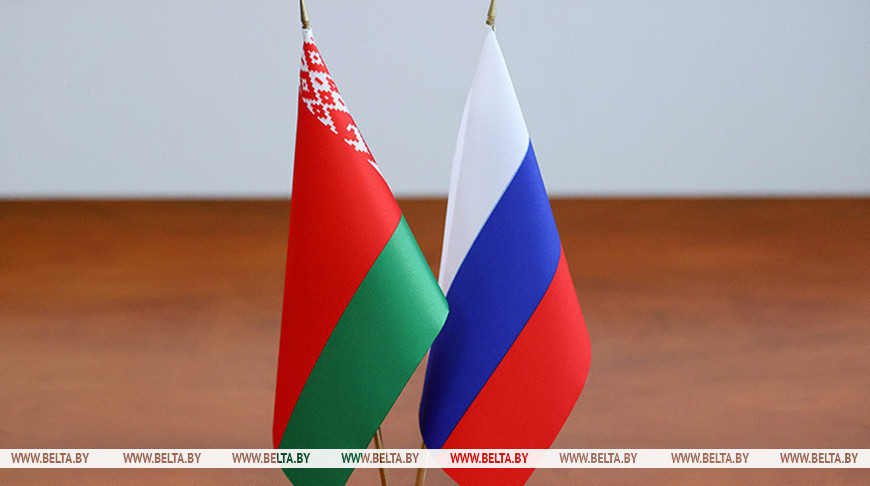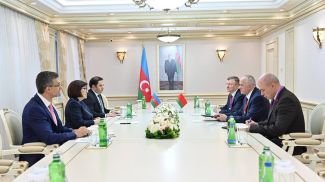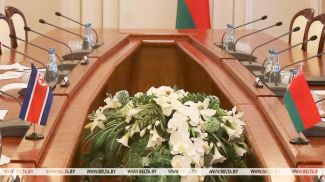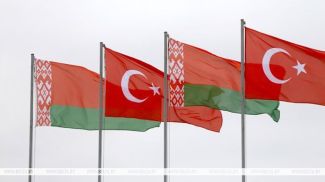
MOSCOW, 26 February (BelTA) - The Russian Parliament has completed the ratification of the treaty on security guarantees within the Union State between Russia and Belarus: on 26 February, the relevant law was adopted by the Federation Council, Russia’s upper house of parliament, BelTA learned.
Earlier, on 18 February, the treaty was ratified by the Russian State Duma.
“Given the current geopolitical situation, this treaty is essential. It is very important, very necessary. A lot of work has been done to prepare and coordinate it,” Federation Council Speaker Valentina Matviyenko said at the sitting.
Presenting the document for ratification, Senator Taimuraz Mamsurov recalled that the treaty was signed by Belarusian President Aleksandr Lukashenko and Russian President Vladimir Putin on the margins of the meeting of the Supreme State Council of the Union State in Minsk on 6 December 2024. “It is important to note that the initiative to sign the treaty came from Belarusian President Aleksandr Lukashenko and received the support in principle of the Russian leader,” the senator said.
“The treaty is defensive in nature and is not directed against any third countries and associations. It obliges the parties to provide mutual support by all means consistent with international law in case of threats to the sovereignty, constitutional order, territorial integrity and external borders of the Union State,” he said.
“The text of the treaty is innovative in many respects, which corresponds to the deep integration within the common defense space of the Union State. This treaty is unique because it stipulates security nuclear guarantees that Russia provides to Belarus in accordance with the new edition of the Fundamentals of State Policy of the Russian Federation on Nuclear Deterrence of the Russian Federation. This means that now Russia's nuclear umbrella also covers Belarus and can be used in the same framework scenarios as Russia would use them for its own defense,” Taimuraz Mamsurov stressed.
According to the treaty, the parties undertake to support each other by all methods and means agreed upon and permissible under international law and to take appropriate actions in the political, military and other avenues in cases of encroachments on the security of any of the parties and the Union State as a whole. Such encroachments are understood to mean the purposeful creation or implementation of a threat to the sovereignty, independence and/or constitutional order of the parties, the integrity and inviolability of the territory and external border of the Union State by third states and their associations, international organizations, terrorist and extremist organizations and groups.
“The parties consider an armed attack on a member state of the Union State as an act of aggression against the Union State as a whole and will take appropriate retaliatory measures using all forces and means at their disposal in accordance with Article 51 of the Charter of the United Nations and the legislation of the parties,” the document states.
It also reads that the parties regard the nuclear weapons of the Russian Federation as an important factor in preventing the outbreak of nuclear military conflicts and military conflicts with the use of conventional means of destruction, as well as a means of deterrence, the use of which is an extreme and forced measure. “The nuclear weapons of the Russian Federation may be used in response to the use of nuclear weapons or other weapons of mass destruction against any of the parties, as well as in the event of aggression against any of the parties with the use of conventional weapons, creating a critical threat to its sovereignty or territorial integrity,” the treaty reads.
"The decision to use Russia's nuclear weapons deployed on the territory of Belarus for its defense shall be made in accordance with the procedure established by the parties," the document reads.
The treaty also stipulates the possibility to jointly counteract illegitimate sanctions. "In case of introduction of unilateral restrictive economic and other measures against any of the parties by third states and their associations, international organizations, any party may initiate consideration of collective counteraction to these restrictive measures, including on the basis of mutual support within the state economic policy and through the adoption of necessary measures by the bodies of the Union State, taking into account the national interests of each of the parties," the document notes.
The treaty has been concluded for a period of 10 years, with automatic renewal for successive 10-year periods, and enters into force on the date of exchange of instruments of ratification.
Earlier, on 18 February, the treaty was ratified by the Russian State Duma.
“Given the current geopolitical situation, this treaty is essential. It is very important, very necessary. A lot of work has been done to prepare and coordinate it,” Federation Council Speaker Valentina Matviyenko said at the sitting.
Presenting the document for ratification, Senator Taimuraz Mamsurov recalled that the treaty was signed by Belarusian President Aleksandr Lukashenko and Russian President Vladimir Putin on the margins of the meeting of the Supreme State Council of the Union State in Minsk on 6 December 2024. “It is important to note that the initiative to sign the treaty came from Belarusian President Aleksandr Lukashenko and received the support in principle of the Russian leader,” the senator said.
“The treaty is defensive in nature and is not directed against any third countries and associations. It obliges the parties to provide mutual support by all means consistent with international law in case of threats to the sovereignty, constitutional order, territorial integrity and external borders of the Union State,” he said.
“The text of the treaty is innovative in many respects, which corresponds to the deep integration within the common defense space of the Union State. This treaty is unique because it stipulates security nuclear guarantees that Russia provides to Belarus in accordance with the new edition of the Fundamentals of State Policy of the Russian Federation on Nuclear Deterrence of the Russian Federation. This means that now Russia's nuclear umbrella also covers Belarus and can be used in the same framework scenarios as Russia would use them for its own defense,” Taimuraz Mamsurov stressed.
According to the treaty, the parties undertake to support each other by all methods and means agreed upon and permissible under international law and to take appropriate actions in the political, military and other avenues in cases of encroachments on the security of any of the parties and the Union State as a whole. Such encroachments are understood to mean the purposeful creation or implementation of a threat to the sovereignty, independence and/or constitutional order of the parties, the integrity and inviolability of the territory and external border of the Union State by third states and their associations, international organizations, terrorist and extremist organizations and groups.
“The parties consider an armed attack on a member state of the Union State as an act of aggression against the Union State as a whole and will take appropriate retaliatory measures using all forces and means at their disposal in accordance with Article 51 of the Charter of the United Nations and the legislation of the parties,” the document states.
It also reads that the parties regard the nuclear weapons of the Russian Federation as an important factor in preventing the outbreak of nuclear military conflicts and military conflicts with the use of conventional means of destruction, as well as a means of deterrence, the use of which is an extreme and forced measure. “The nuclear weapons of the Russian Federation may be used in response to the use of nuclear weapons or other weapons of mass destruction against any of the parties, as well as in the event of aggression against any of the parties with the use of conventional weapons, creating a critical threat to its sovereignty or territorial integrity,” the treaty reads.
"The decision to use Russia's nuclear weapons deployed on the territory of Belarus for its defense shall be made in accordance with the procedure established by the parties," the document reads.
The treaty also stipulates the possibility to jointly counteract illegitimate sanctions. "In case of introduction of unilateral restrictive economic and other measures against any of the parties by third states and their associations, international organizations, any party may initiate consideration of collective counteraction to these restrictive measures, including on the basis of mutual support within the state economic policy and through the adoption of necessary measures by the bodies of the Union State, taking into account the national interests of each of the parties," the document notes.
The treaty has been concluded for a period of 10 years, with automatic renewal for successive 10-year periods, and enters into force on the date of exchange of instruments of ratification.













